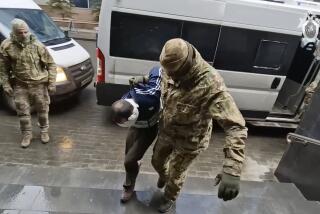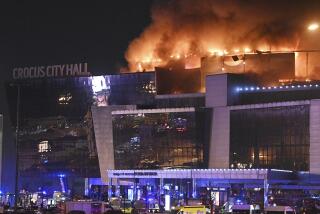A history of terrorism out of Chechnya
- Share via
A massive Russian crackdown on Chechnya’s bid for independence in the 1990s and the installation of loyal leaders there pushed the Caucasus Muslim enclave from the headlines years ago. But resentment has festered and at times bled into the global holy war being waged by Islamic militants.
It appears unlikely that oppression of Chechnya’s Muslim majority instigated the attack on the Boston Marathon, in which two Chechen emigre brothers are suspects. The two were young when they arrived in the United States and weren’t known to associate with militants.
But the unhealed wounds of the Chechnya conflict, which raged for five years after a 1994 uprising, serve as a reminder that localized religious and ethnic tensions can spill across borders.
Chechen fighters have traveled to Afghanistan, Pakistan and neighboring Caucasus regions for military and explosives training, joining their cause to a worldwide jihad.
Chechen militants and their foreign supporters who trained at Al Qaeda-run camps in Afghanistan were among the terrorist suspects swept up after the U.S. invasion and imprisoned at Guantanamo Bay or CIA “black sites.” Some are still believed to be in indefinite detention.
And Chechen warlords have been added to the U.S. list of terrorist suspects, most recently in February 2011 when Doku Umarov was branded a fugitive enemy after he claimed responsibility for organizing suicide bombings on Moscow’s subway in 2010 that killed at least 40 people.
No Chechen leaders have made overt threats to attack the United States, said Simon Saradzhyan, a Russian fellow at Harvard Kennedy School’s Belfer Center. He added, though, that Umarov’s listing could be “a narrative to justify attack.”
Thousands of Chechen civilians, like the family of Boston suspects Dzhokhar and Tamerlan Tsarnaev, fled the southern Russian territory during and after the secessionist wars, which scattered refugees across Europe and the United States.
Some have proved vulnerable to recruitment by militants, such as 25-year-old Lors Doukayev, who in 2010 attempted to bomb the Danish newspaper Jyllands-Posten after it published cartoon-like images of the prophet Muhammad.
Chechen immigrants have been arrested as recently as a month ago in France, and others have been prosecuted in Spain and Austria, accused of committing violence and plotting against foreign targets.
A few Chechens were spotted among foreign fighters battling U.S. troops around the Iraqi insurgency stronghold of Diyala in 2005. A small but sustained presence of Chechen fighters has been reported in the lawless tribal belt along the Afghanistan-Pakistan border that has long been a sanctuary for Al Qaeda and the Taliban.
But Chechnya was never much of a rallying cry for Islamic militants in the Middle East, said Talaat Mosallam, a retired Egyptian general and security expert. “There was a lot of sympathy for the Chechnya issue in Egypt in the period during the conflict between Chechnya and Russia. Interest in it died down soon after,” he said.
While many Islamic militants target the United States because of its military interventions in Iraq and Afghanistan, the Chechen insurgency is more squarely focused on Moscow, with often deadly effect.
Chechen fighters seized hundreds of hostages in the southern Russian town of Budennovsk in June 1995, and more than 100 were killed in a botched raid to free them. Seven months later, rebels grabbed hundreds from a hospital in the Dagestani town of Kizlyar, bused them to the Chechen border and used them as human shields. Dozens died.
Suicide bombers killed scores of police, soldiers and commuters during the early years of the last decade, and 129 hostages and 41 Chechen militants died in a 2002 standoff when Russian special forces stormed a Moscow theater where 700 were being held hostage; most deaths were caused by gas intended to knock out the gunmen. The deadliest attack occurred in 2004, when 331 hostages — half of them children — died in the retaking of a school in the North Ossetia town of Beslan.
“The Chechen resistance might have an anti-American motive, but the U.S. government and U.S. NGOs have been very critical of the Russian war in Chechnya. They have stood by Russia when Chechens commit acts of terror, but it’s not as if we have underwritten [Russian President Vladimir] Putin’s policies in Chechnya,” said Rajan Menon, a City College of New York professor and senior fellow at the Atlantic Council. “Quite to the contrary.... There’s no particular beef the Chechens have with the United States.”
Times staff writers Sergei L. Loiko in Moscow, Emily Alpert in Los Angeles, Alex Rodriguez in Islamabad, Pakistan, Ned Parker in Beirut and Jeffrey Fleishman in Cairo, and special correspondent Ingy Hassieb contributed to this report.
More to Read
Sign up for Essential California
The most important California stories and recommendations in your inbox every morning.
You may occasionally receive promotional content from the Los Angeles Times.











